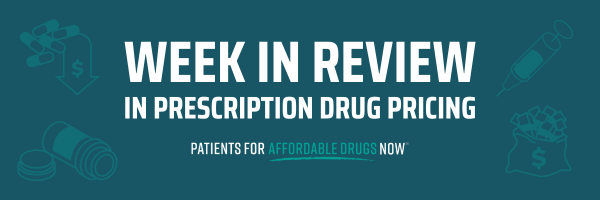
Heard, chef! It’s thyme to lower drug prices for all people.
Welcome to the Week in Review.
1. Lawsuits Over Medicare Negotiation Program Trickle In
- More evidence again this week that Big Pharma will stop at nothing to keep drug prices high for patients. Four long-expected lawsuits have been filed across the country in an effort to stop the implementation of Medicare’s new drug price negotiation program. Following the lawsuits filed by Merck and the U.S. Chamber of Commerce earlier this month, drug corporation Bristol Myers Squibb (BMS) and drug industry group PhRMA, alongside two other groups with ties to pharma, also filed suit against the federal government. BMS and Merck’s lawsuits share an allegation that the law violates the First and Fifth Amendments, even going as far as saying the program is “extortion.” But we see through the spin: Corporations like BMS and Merck have been extorting patients with unjustified drug prices for decades and, finally, negotiation addresses its unbalanced power! PhRMA and the Chamber’s suits mirror the others — with the addition of an unfounded claim that drug companies have no say in the process. In fact, the Centers for Medicare & Medicaid Services (CMS) is voluntarily soliciting comments from corporations throughout implementation, it is drug corporations who forced excessive prices that led to patients suffering due to lack of access, and only a narrow amount of drugs are subject to negotiation. Despite legal efforts to stall Medicare negotiation, drug corporations are no match against the power of patient advocacy. The drug price reforms are here to stay. (Fierce Pharma, The Washington Post, Axios, CNBC)
2. Zeroing In On PBM Reform
- Pharmacy Benefit Manager (PBM) reform still remains top of mind on Capitol Hill. Senator Chuck Grassley spoke to STAT about the urgency of reforming the middlemen’s practices: “We’ve got to pass legislation. We can’t put up anymore with … middle people, between the companies and the consumer, without knowing what they’re doing, particularly when they’re raking in a lot of taxpayer money.” We agree! A year-long STAT investigation dove deep into the industry and shed light on the secret deals, fees, and kickbacks orchestrated by PBMs who are supposed to be operating in the best interests of patients. The report established that a number of major consulting firms, who are hired by employers to handle and advise on prescription drug coverage, also benefit by collecting fees from large PBMs for each prescription. STAT writes that these firms “often are getting paid more — a lot more — by the PBMs and health insurance carriers that they are supposed to scrutinize than by companies they are supposed to be looking out for.” Who pays the price for these expensive and opaque arrangements? Employees. As both chambers of Congress and the Federal Trade Commission zero in on the shady practices of PBMs, it’s clear that the time is ripe to peel back the curtain. (STAT, STAT)
3. Debunking Drug Industry Lies
- Big Pharma doublespeak is rife this week. Eli Lilly announced a $2.4 billion purchase of biotech company DICE Therapeutics which has a small molecule inhibitor in Phase II trials. Yet it was only last week that Lilly’s CEO David Ricks touted a lie that the new drug price law is harming investment into small molecule drugs. It’s evident that drug corporations are not slowing down their investments, despite the fear tactics deployed from industry executives. In fact, Flagship Pioneering — the firm behind Moderna and Laronde — gave $50 million to a new startup “focused solely on small-molecule drugs.” While we constantly hear the refrain about the Inflation Reduction Act “harming” innovation, we know the truth: Big Pharma is dishing out lies to distract us from the enormous profits that they bring in at the expense of patients. (Endpoints, STAT, Arizona Daily Star)
4. Innovation Is Worthless If Patients Can’t Afford It
- While cell and gene therapies may soon be able to cure some of the world’s most complex diseases, it is imperative that these new treatments are affordable for patients. First up: sickle cell gene therapy. Bluebird bio is racing to get approval for its one-time gene therapy for sickle cell disease, which is expected to be priced at between $2 million and $3 million per patient. Second: cystic fibrosis treatment. A new analysis showed that the price of cystic fibrosis treatment Trikafta, currently listed at $311,741 per year, is much higher than the value it delivers. “It is essential for therapies to be priced based on value,” echoed the team of scientists that led the study, noting that the high costs of therapies “are straining health care affordability” for patients. And lastly: the world’s most expensive drug. Hemgenix, a single-use gene therapy priced at $3.5 million per dose, was administered to a patient living with hemophilia B for the first time this week. Innovation is worthless if patients can’t afford it — that’s why we need to urgently address high launch prices for new life-changing drugs coming to market. — (Biopharma Dive, Cystic Fibrosis News Today, Pharmaceutical Technology)
Have a great weekend!
